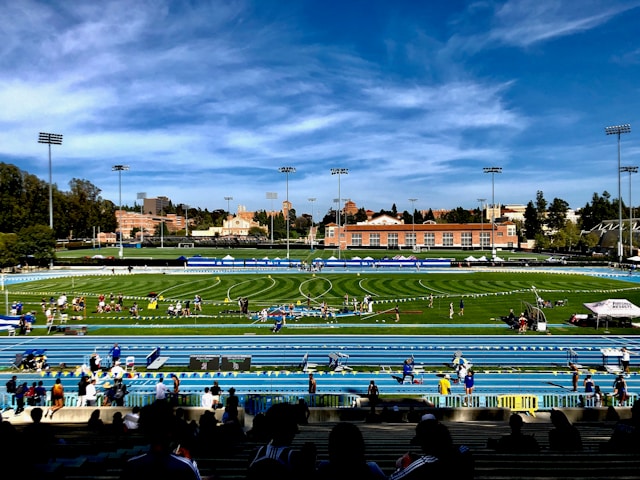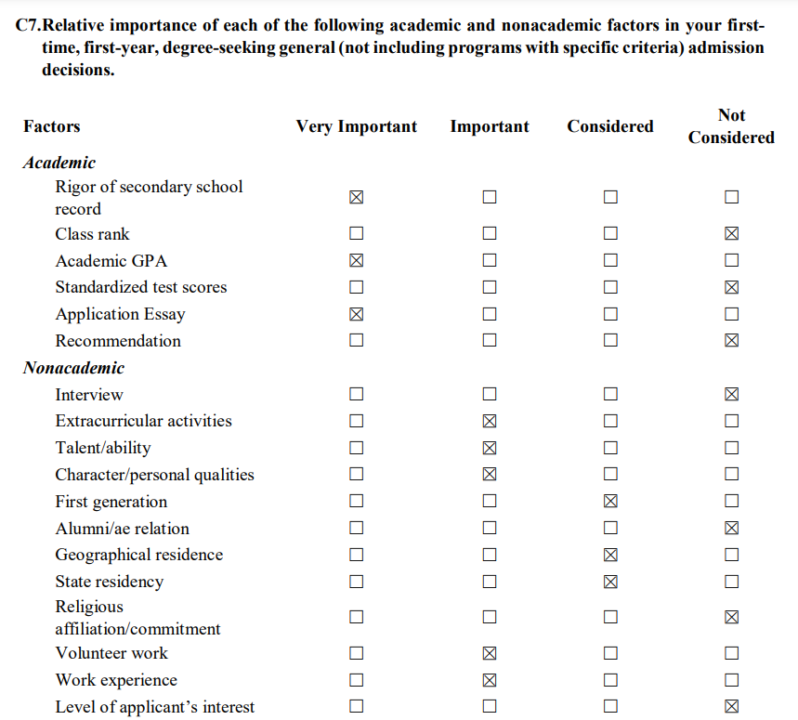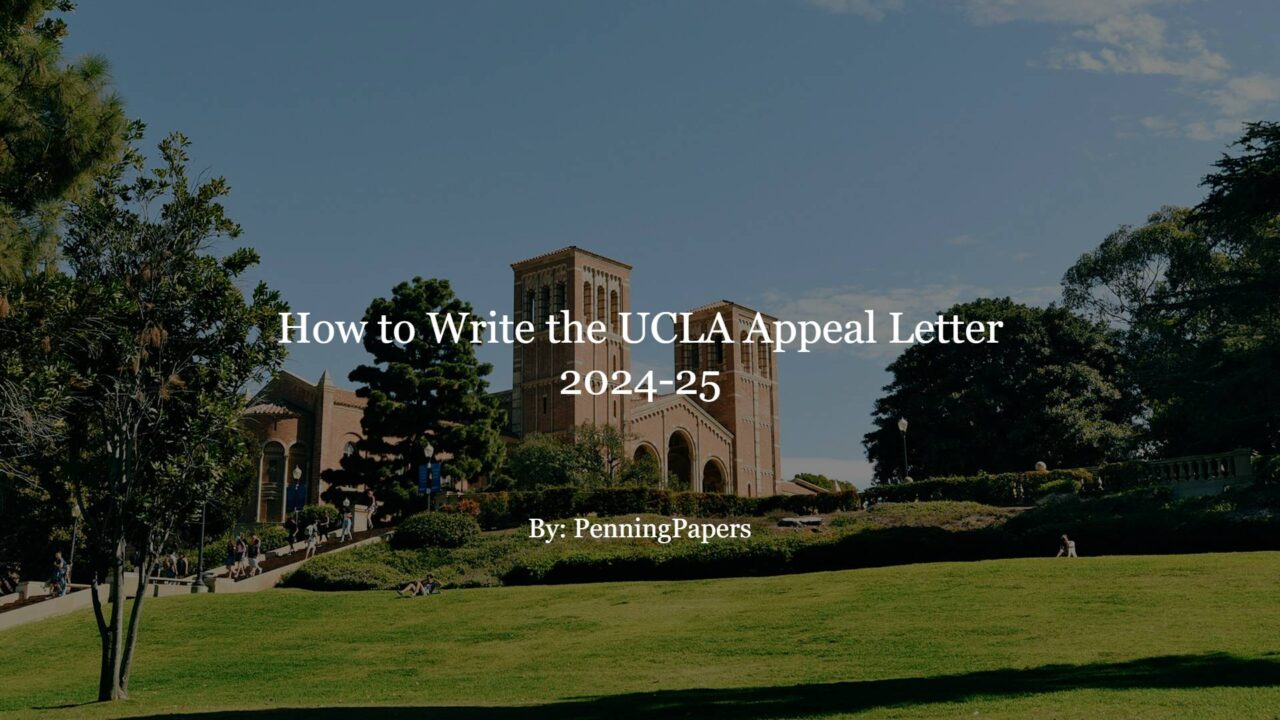If you’re planning to write a UCLA appeal letter, you may have a few questions. Two of the most common questions we get are the following:
- Is there practically no chance of UCLA accepting me via appeal?
- Even if the admissions chances are small, how do I write the UCLA appeal letter to stand out?
We’ll answer both these questions in this guide.
Note: UCLA admissions rarely accepts appeals. The advice in this guide does not guarantee acceptance. It guarantees you will write the best quality appeal letter you can and maximize your chances of acceptance into UCLA.
With that said, let’s get right to the guide.
Table of Contents
- Does Appealing to UCLA Work? What are the Chances?
- What is the Best Strategy to Appeal a UCLA Admission Decision?
Professional College Application Help.
Contact us. We'll get to you within 24 hours.
Does Appealing to UCLA Work? What are the Chances?

Short answer: yes. The UCLA appeal process isn’t worthless. You can still get accepted, and it’s not a total waste of time.
But, your chances are very, very slim.
Now, how slim of a chance are we talking about here?
Let’s take a look at UCLA’s appeal statistics over the years.


Source photo 1: UC High School Counselor Conference 2022; Source photo 2: UC High School Counselor Conference 2023
For the 2022 admissions cycle, UCLA admitted 25 of 1,341 students via appeal, making their appeal admissions rate 1.86%. Meanwhile, for the 2023 admissions cycle, UCLA accepted only 1 student out of 1,587. This makes their most recent appeal admit rate a meager 0.06%.
This means UCLA’s appeal rate over the past 2 years has dipped by about 96.77%.
But, don’t feel too sad!
The appeal process is a second chance. And, that’s far better than complete rejection.
In fact, more often than not, many clients who come to us for regular decisions applications don’t even know that appeal options are even available. Most who don’t know even are glad that the option to appeal exists!
A good rule of thumb is that if your chance of getting into your dream school is greater than 0, it is technically speaking infinitely greater than 0. Thus, it’s always worth applying no matter the acceptance rate so long as the school you’re appealing to is your dream school.
If UCLA isn’t at least somewhere at the top of your list, you don’t have to appeal to it. You can always wait for another year such as the transfer admissions season.
Often, just a few hours of drafting a solid appeal letter is very, very worth the chances of acceptance (even if it’s small!)
Now, because the chances are so slim, you’re going to need to write the UCLA appeal letter in a manner that stands out. A unique letter is key.
This may seem impossible to some. However, we’ve found applicants had more to their application than they think. In fact, many students we’ve worked with were shocked just how many topics they could write about with just a bit of brainstorming. We cover this more in-depth in Section 2 part A and Section 2 part B.
What is the Best Strategy to Appeal a UCLA Admission Decision?

An impactful appeal letter can make a massive difference. In fact, it’s all you’ve got to improve your chances of a successful appeal.
But, don’t be thinking that tears and sob stories are going to get your foot in the door.
You’ll need solid topics and powerful reasons. For, UCLA already has the students they need. The appeal process is a service to students. It’s UCLA’s way of extending an olive branch to students who felt wrongfully rejected. So, they’re not technically obligated to accept you!
Now, let’s cover what to actually put in the appeal letter!
What Should I Write in the UCLA Appeal Letter?

Here’s what UCLA says about their application appeal process.
“For an appeal to have merit, it must bring to light new academic and personal information, as well as information pertaining to extenuating circumstances, that had not been present in the application.
When we talk about presenting “new” information, we mean information not already presented in the original application (e.g. classes that were not listed as AP or Honors that should have been, additional coursework, etc.) — information that clearly shows the student to be stronger than had been earlier evidenced. High grades received in the senior year, recently acquired awards or additional extracurricular activities are not a basis for the reversal of a decision since decisions are based on academic information that was available at the time of application.”
UCLA Appeals Official Website
We often hear people say they have no “new or extenuating circumstances” to talk about.
“I already said everything I needed to say in the regular or transfer application.”
However, as we mentioned earlier, most applicants have more to add in their appeal letter than they think.
We’d say about 90% of our students have missed other details that they simply glossed over during the application process. The most common ones are academic difficulties and grade trends.
However, another common one involves undiagnosed learning conditions like Dyslexia and ADHD. This is actually a very surprising one that a lot of our students didn’t know they could cover. In fact, it’s actually a very important element for admissions officers to consider; and, talking about learning conditions like ADHD (appropriately) can improve chances dramatically.
Note: writing about learning conditions like ADHD in your UCLA appeal letter may work well so long as you do it appropriately. Often, you must demonstrate how your learning condition has impacted your ability to perform. Or, if your grades are strong, how you managed to persevere despite the learning condition. If you plan to write about ADHD, consider reading our sister article here.
Other less common but still valuable topics include family emergencies and difficulties that “threw a monkey wrench” at their academics. These can lead to dips in performance. Or, if the student’s grades remained the same
If you are not sure about what you can or cannot write about in the UCLA appeal letter, or you don’t know if you have anything to write in the appeal letter at all, do not be afraid to schedule a free over-the-phone brainstorming session with us! We can help you if you have nothing to say in your UCLA appeal letter.
Figuring Out What Went Wrong: Why Did I Get Rejected From UCLA?

When writing your appeal letter, it’s important to know why admissions officers may have rejected you.
Of course, predicting this is technically impossible. But, you can make a general inference via process of elimination.
Take a look at this list below for all the variables admissions officers may judge students on. See which ones you may have fallen short in (minus the variables labeled “Not Considered”)

Look through this list one item at a time. Check your rejected application and see where your deficiencies were. For example, perhaps your academic performance dipped from Sophomore year through Junior year. It went from a 3.6 to a 3.4. You may need to provide an explanation for the dip in your academic performance as well as the ways you’ve increased or stabilized your grades over time.
Roughly speaking, you need a valid reason that demonstrates how you were a better candidate than originally expected. Do this for each item on the list; then, you’ll have a good set of topics for your UCLA appeal letter.
The types of things you write will, of course, vary depending on whether you’re writing the regular decision appeal letter or transfer appeal letter. Brainstorm the topics for your appeal letter depending on your application type and background.
Formulating The UCLA Appeal Letter.

Now that you have a list of topics to write about for your UCLA appeal letter, it’s time to put all the pieces together.
When writing the UCLA appeal letter, you want to start by thanking the admissions officers. After all, they’re taking the time to reconsider your application after spending countless sleepless hours sifting through piles of applications! So, be considerate both in the beginning and the end. Thank them.
Next, be sure not to claim the admissions office is “wrong” in their decision.
Of course, there are exceptions to this like technical errors and whatnot. But, most admissions officers judged correctly. They take time and consideration to make decisions.
Instead, write about why you’re a suitable candidate based on the new information you provide. Then, why said new information provides a new context that is significant enough to warrant reconsideration.
So, don’t write about how you forgot to add an A in your test or how you also did an extra minor task in a club. Instead, cover major details that derail the original application completely. For instance, environmental issues like noise and unsuitable study backgrounds can have a massive impact on your ability to perform compared to most students. And, it may paint a better picture for AOs of just how hard your academic experience really was. You must follow through with WHY the topic you’re covering warrants a new perspective of your original application.
So, here’s an example.
- In your initial application, you failed to demonstrate the mental health issues that stemmed from the multiple projects you undertook in your Sophomore year. You took on more than you could, and that led to the dip in academic performance in your Sophomore Fall and Spring grades. However, in narrowing your extracurricular focus, you managed to make your projects more efficient, your mental health more stable, and therefore your grades higher for the junior year.
- You failed to mention this in the previous application. You believe it demonstrates your fit as a strong candidate, as it tells a story behind your previous poor performance. It also shows how you were able to overcome some of your insufficiencies, and you will translate these skills to UCLA.
Notice how #1 brings new information to the application process?
While admissions officers knew of the applicant’s grades, they didn’t know of the reasons behind it.
However, it is equally important that #2 shows HOW #1 makes the applicant a good fit for UCLA. It highlights that the events that took place demonstrate his skill in overcoming mental health issues and lower grades, and that they can prove their future performance at UCLA.
Key Points to Keep in Mind.

You may also want to keep these points in mind when writing the UCLA appeal letter.
Many UCLA appeal applicants believe they can “get lucky.”
And, while luck plays a role, the appeal process isn’t random. People often say admissions are “random” as a comforting statement. But, this isn’t true. It’s not a raffle ticket. Your UCLA appeal letter is based on its writing proficiency and topical validity for reconsideration.
Speaking of writing ability, do not consider the appeal letter similar in nature to answering the PIQ questions. The PIQ questions are more informal and deep in nature. The appeal letters follow a more formal structure.
UCLA Appeal Letter Deadline and Word Count.

For freshman applicants, your UCLA appeal letter submission window is April 1st – 14th.
For transfers, the deadline is May 15th.
You can submit your appeal letter through UCLA’s online portal.
The appeal letter has a character limit of 7,000 characters. More often than not, students don’t need to write all 7,000 characters. A good length to keep your UCLA appeal letter would be 4,000 – 6,000 characters. However, reaching closer to 7,000 is fine for those who have details that require more description.
If you are still unsure about what to write in the UCLA appeal letter, or have not started writing it yet, we would highly recommend you schedule a free 30-minute phone consultation with us. The appeal process is hard enough. So, it helps to get as much professional advising on your appeal letter as you can. We can help you stand out amongst the rest of the application pool.

